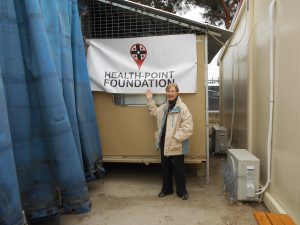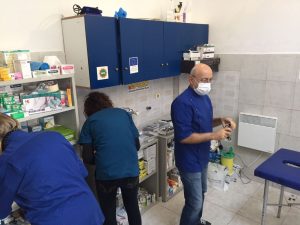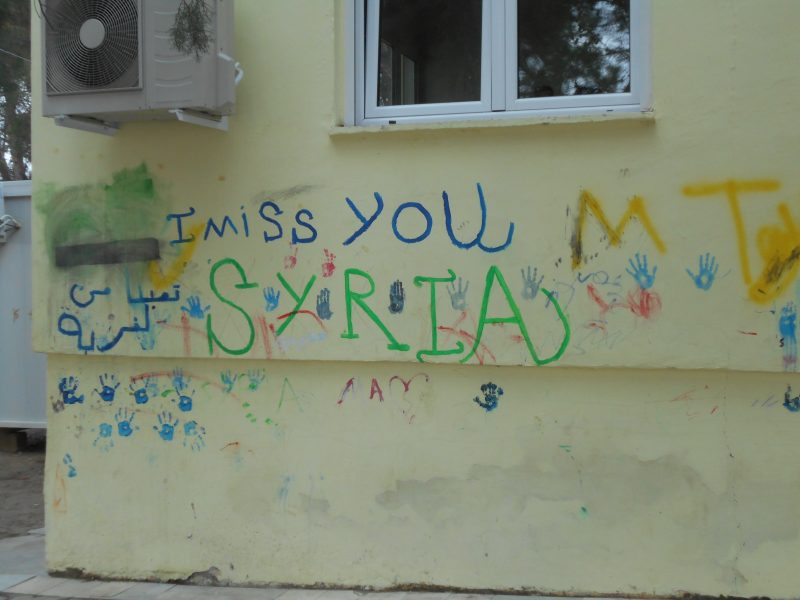Readers of Rye News may have been following the articles I have written about my experiences among the refugees, mainly Syrian, who became stranded in northern Greece when the borders closed and their onward journey was prevented. I have recently returned from my third visit to the area around Thessaloniki in northern Greece to help with the provision of emergency dental relief for the many refugees of all ages currently living there. Diana, my wife, again accompanied me to offer practical assistance.

On the previous trips we had worked in tents or disused, sometimes derelict, buildings so I was apprehensive this time because the weather in the area had been exceptionally cold, much colder than here and I was wondering how we’d cope. When we arrived though we discovered that the situation has changed from our last visit in November. We did not see anyone living in tents, instead they are in converted portacabins, hotels or apartments that have been rented for them the money coming, we understand, from the UNHCR and the EU. This transition was proving difficult at times for HPF (Health Point Foundation – the organisation we were volunteering with) because camps could be closed at short notice and the refugees moved with HPF having no advance notice or information to enable them to plan their schedule of outreach clinics.
The provision of food is now via a monetary allowance allowing people to cater for themselves which was appreciated by those who’d lived for months on food delivered to them ready prepared. However, this has created a certain amount of resentment among some Greeks who are struggling themselves as there is a high rate of unemployment and pensions have been cut. In one of our clinics held in a hotel in Asprovalta, a pleasant seaside resort, the hotel’s owner was anything but welcoming and clearly resented our presence. We set up the clinic in a large reception room, the fact that we had to share the room with the impromptu primary school that has been created for the refugee children in the area added to the novelty of the occasion!
Another clinic was held in the living/dining room/kitchen of the rather run-down and basic apartment of a family from Aleppo now housed in the town of Polykastro. They graciously allowed us to take over their flat but I had to smile when part way through the day I reflected that I had never before worked in a surgery where a lady was frying tomatoes and onions in one corner, children were running to and fro while men drinking sweet tea and smoking were sitting waiting their turn to be seen. We saw a lot of patients that day and worked about seven hours straight through without a break. Being at this site highlighted how the logistical challenges have changed since our last trip. When based in a camp we knew that the patients were all within walking distance, now they might be housed several miles away and we could not have coped without the assistance of a German charity – Doc Mobile – which undertook to get the patients to us and then back home again.
Some cultural differences became apparent in the case of a little girl, aged five, with toothache who was dropped off by her parents while they went off elsewhere. She waited patiently all day, no dentist (we were a team of three that day) wanted to see her without a parent being present but after she’d been sitting for many hours with no sign of a parent she was eventually seen and examined but, perhaps unsurprisingly, refused to have any treatment. The story does not end there. We returned to set up a clinic in the same apartment three days later but due to some misunderstanding we hadn’t been expected, despite this we were still allowed in and welcomed. The same small girl appeared again and fell to my lot, knowing what had happened previously I felt my heart sink a little. However, she was with her father this time and in the event, much to my relief, proved to be a model patient.

In October we’d been to the foot of Mount Olympus to a refugee camp for Yazidi people in and around a disused and derelict psychiatric hospital. As it was then already rather cold we’d been concerned about their fate in the ensuing bitter weather. We had the chance to find out what had become of these people when we when to Loutra Volvi, a quiet town 50 minutes drive from Thessaloniki, to set up our clinic in a small room used for medical examinations but which, being Sunday, was made available to us. We had to clear the room in order to set up our equipment – no easy task as it was rather cluttered and were under strict instructions that we had to put it back exactly as we had found it. We had the luxury of heating in this clinic, not always the case in every venue.
We found that this was the area to which the Yazidis had been moved and we met the young man who’d been our interpreter previously. His English was even better, he was self-taught having only started to learn once he’d left Sinjar. In even, unemotional tones he gave a brief outline of his family’s agony of fleeing to Mount Sinjar, eventually escaping and the perilous sea crossing to Greece. He was applying to be accepted for settlement in Australia, such a talented and motivated person would probably do well anywhere, but one could not necessarily imagine the same future for some of the older people more likely to be without the skills and aptitude that would enable them to adapt to a new country.
We were operating two chairs that day, our Yazidi translator spoke Kurdish and Arabic but not English so the conversation with the patient had to go via this translator and then via another Arabic/English translator and back again! I rapidly learnt the Kurdish for “open” and “close” to add to the Arabic that I’d acquired previously. It was a busy day, after a slow start a long queue built up and we worked for eight hours without taking a break, as we didn’t want to turn anyone away without having been seen though, as previously, the equipment available meant that I wasn’t always able to offer the necessary treatment. We were limited to simple fillings and extractions – sometimes frustrating and we discovered that the referral system to the dental school for more complicated treatment that we’d worked to set up on our last trip hadn’t come about but was still work in progress.
One day was spent in Diavata, a static surgery in a shipping container where I’d worked on previous trips. Luckily our interpreter spoke Arabic, Farsi and English, otherwise the consultation with an Afghan lady who spoke only Farsi would have been very difficult and although her dialect proved a little tricky for him he coped well. In the course of taking a medical history a terrible story emerged of the lady being badly injured and her son killed while they were trying to rescue her daughter who’d been kidnapped.
As previously, we met volunteers from many countries. One gentleman from Saudi Arabia had come over to deliver text books for the children and stayed on for several days to act as an interpreter. He told us that the story and plight of the Syrian refugees was not well known and widely publicised in Saudi Arabia, he was going to return home with the intention of trying to do something about this. One volunteer was Australian, but has close family members in Aleppo who had decided not to leave because they could see the refugees’ situation was not a happy one. Staying in Syria was not good either – they had concluded that they had no other option but to carry on as best they could. It was interesting to be told that many Syrians felt bitter that the oil-rich Arab countries have not come forward to help them, they felt they had been abandoned to their fate. Another Syrian refugee made the comment that he’d been told, while in Syria, that Muslims such as himself were hated by Christians. However, he’d seen people from all over the world, some of them Christians, come to Greece to assist the refugees and he’d realised that that what he’d thought about Christians wasn’t true.
Photos: Kyriacos Hajikakou




I am full of admiration for what you are doing. Really well done!
What an invaluable job the two of you are doing. It’s not just the dental skills; just as (even more?) important is the proof to so many unfortunate refugees that there are people who care — and the possibility of inspiring others with skills to follow your example.